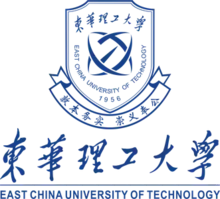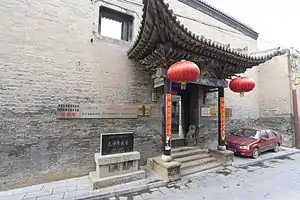East China University of Technology
East China University of Technology (ECUT; simplified Chinese: 东华理工大学; traditional Chinese: 東華理工大學; pinyin: Dōnghuá Lǐgōng Dàxué), is a public university located in Nanchang, Jiangxi. It was the first university in China's nuclear industry.
东华理工大学 | |
 | |
| Motto | 敦本务实,崇义奉公 |
|---|---|
| Type | Public |
| Established | 1956 |
| President | Sun Zhanxue |
Academic staff | c. 2,800 |
| Students | c. 23,000 |
| Address | 418 Guanglan Ave, Qingshanhu District , , , 330013 , |
| Website | www |
ECUT is the pilot university of the Outstanding Engineer Education and Training Program of the Ministry of Education, the Plan 111 of the Ministry of Education, the Basic Capacity Building Project of Colleges and Universities in the Central and Western regions to support universities, and the New Engineering research and practice projects to be selected in colleges and universities.[1]
History
ECUT, originally established in 1956 in Shanxi Province. It started as Taigu Geological School. It belonged to State Second Mechanic Industry, a state defense institution.
It was jointly built by the People's Government of Jiangxi Province, the State Administration of National Defense Science, Technology and Industry, the Ministry of Natural Resources, and the China Nuclear Industry Corporation.
In 1958, ECUT moved to Fuzhou, Jiangxi Province due to the abundant uranium deposits, and later to Nanchang.
Presently, ECUT is jointly run by the Jiangxi Government and China Atomic Energy Association (CAEA), the Ministry of Natural Resource (MNR), China National Nuclear Corporation (CNNC).[2]
Curriculum

From its inception, ECUT has focused on the fields of nuclear science and geoscience and expanded to engineering, science, language, economy, and arts. ECUT offers one doctoral program, 71 master programs, and 68 bachelor programs. Most of these disciplines are connected to the traditional fields at ECUT, forming more than 20 schools and research centers.[3]
Since its establishment, ECUT has focused its education and research in the field of Nuclear Science and Geology Science, with the relevant disciplines, developed gradually. Based on the featured disciplines ECUT has developed into the fields of Geological Tourism, Geological Economy, Geological Chemistry, and Geological Environment etc. So far, ECUT has extended its education and research to engineering, science, language, management, economy and arts, among which 1 doctoral program, 71 master programs and 72 bachelor programs, forming more than 20 schools and research centers.[4]
Students and staff
ECUT has a team of 2,800 teachers as its full-time staff, including 123 professors. Around 23,000 students study on the campuses. ECUT enrolls international students, including doctoral programs, master programs, and bachelor programs.
Leaders and notable alumni
- Qian Qihu (钱七虎), Honorary Principal
- Xu Yuejin (徐跃进), Secretary of the Party Committee
- Liu Hesheng (柳和生), Secretary of the Party Committee
- Sun Zhanxue (孙占学), Principal, Deputy Secretary of the Party Committee
- Liu Zichun (刘紫春), Deputy Secretary of the Party Committee
- Liu Xiaodong (刘晓东), Vice principal
- Tang Bin (汤彬), Vice principal
- Guo Fusheng (郭福生), Vice principal
- Chen Xiaoyong (陈晓勇), Vice principal
- Nie Fengjun (聂逢君), Vice principal
- Li Deping (李德平), Vice principal
- Chen Huanwen (陈焕文), Vice principal
- Wan Jifeng (万继锋), Secretary of the Discipline Inspection Commission
- Zeng Jiehua (曾洁华), Deputy Secretary of the Discipline Inspection Commission
- Gong Jianya (龚健雅), Academician of the Chinese Academy of Sciences (CAS)
- Wang Yaonan(王耀南), Academician of Chinese Academy of Engineering(CAE)[5]
Faculties
- School of Earth Science
- School of Nuclear Science and Technology
- School of Geophysics and Measurement and Control Technology
- School of Chemistry, Biology and Material Science
- School of Water Resources and Environmental Engineering
- School of Geomatics
- School of Civil and Architectural Engineering
- School of Information Engineering
- School of Software Engineering
- School of Mechanical and Electronic Engineering
- School of Economics and Management
- School of Literature and Law
- School of Foreign Languages
- School of Science
- School of Marxism
- School of Teacher Training
- School of Physical Education
- School of Vocational Education
- School of Postgraduate Education
- Jiangxi Key Laboratory of Nuclear Resources and Environment
- Jiangxi Key Laboratory of Mass Spectrometry and Instrumentation
- International School
Research environment
ECUT has more than ten national and provincial laboratories: the State Key Laboratory of Nuclear Resources and the Environment, the National Defense Key Discipline Laboratory of Radioactive Geology and Exploration Technology, the Science Ministry's International Cooperation Base of Earth Environment, the Education Ministry's Engineering Research Centre of Nuclear Technology, the Reference Laboratory of IAEA and the National Experimental Teaching Demonstration Center of Radioactive Geology. In addition, two training centres, the Uranium Geology and Isotope Hydrology Advanced Training Center of IAEA, and the Overseas Uranium Resources Exploration are present.
Campus
ECUT has two campuses, located in Nanchang and Fuzhou. The main campus is situated in Nanchang, the capital of Jiangxi province. The other campus, approximately 80 km southeast of Nanchang, is in Fuzhou. The two campuses occupy an area of 1400 km2.
References
- "School Introduction". CUSAS. Retrieved 2019-10-10.
- "Brief Introduction". eng.ecut.edu.cn. Retrieved 2021-01-15.
- "Brief Introduction of ECUT". is.ecut.edu.cn. Retrieved 2019-10-10.
- "Brief Introduction". eng.ecut.edu.cn. Retrieved 2020-12-14.
- "现任领导".
External links
- ECUT Official Website in English
- Official website East China University of Technology Official Website (Chinese)
- Introduction to East China University of Technology
- ResearchGate - East China University of Technology